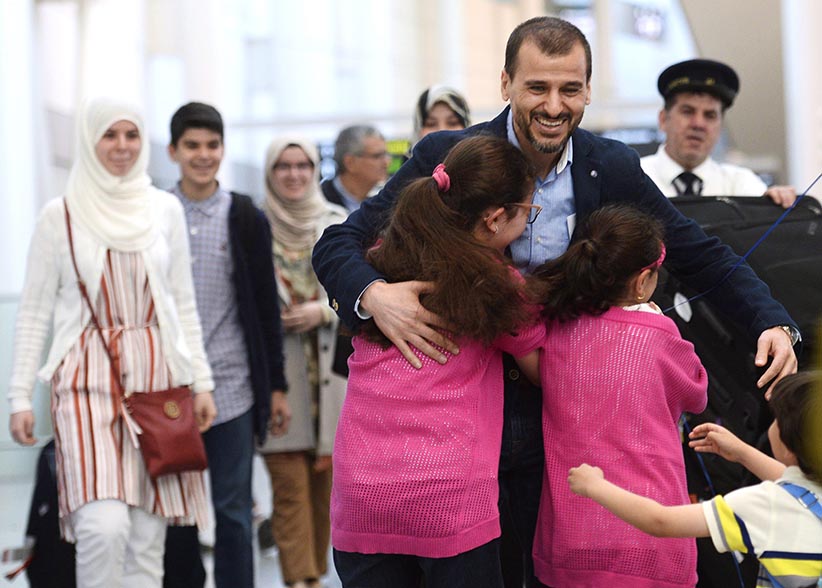Talking Points: Of fumbling blowhards and flushing graveyards
Speed read the news with our Talking Points round-up—our short takes on the news—and sound like the smartest person in the room.
Republican presidential candidate Donald Trump at a rally at the Delaware State Fairgrounds in Harrington, Del., April 22, 2016. (Damon Winter/The New York Times/Redux)
Share

1. Regaining ground against ISIS.
Iraqi government forces retook the centre of Falluja on Friday in what might be the week’s most underplayed news. The city had been an Islamic State redoubt for two years, with tens of thousands of residents effectively serving as human shields. But recent U.S. airstrikes allowed those people to flee, and government troops quickly recaptured key buildings and infrastructure. Islamic State fighters still cling to strongholds in the city’s west, and streets remain mined with explosives. But in the push to rid Iraq of Islamic State, this is a vital first step.
2. Nazi sins, not forgotten.
Though no cause to celebrate, the conviction this week of a 94-year-old former Auschwitz guard is nevertheless fitting and important. Reinhold Hanning, an SS sergeant who worked for 2½ years at the Nazi death camp, was found guilty in a German court of more than 170,000 counts of accessory to murder. Hanning’s five-year jail sentence reflected his low-level role at the facility—he, like so many others, was following orders. Yet it carries symbolic weight, reminding us that time hasn’t erased the horrors of the Holocaust. Never should, and never will.
3. Will Calgary get a Olympic redux?
Calgary will spend $5 million exploring a bid for the 2026 Winter Olympics. Few would argue that the 1988 Games weren’t good for the city, and the country as a whole. And while other Canadian municipalities like Toronto and Quebec City have shied away recently for fear of the cost, Calgary is in a unique position, with many of the venues from last time still up and running. It will be a test of the International Olympic Committee’s commitment to leaner bids and cheaper Games, but it’s worth a shot.
4. Trump begins turning into a chump on the stump.
The polls haven’t been kind to Donald Trump since he tried to turn the Orlando massacre to his political advantage—renewing his call for a ban on Muslim immigration and suggesting Barack Obama secretly supports terrorism. Hillary Clinton’s lead has expanded to double digits, and Trump’s negatives are sky-high among pretty much everyone but old white men. This week, he fired his campaign manager and promised a reset. But it may already be too late: he has little money and has ceded all the TV ad space to Clinton this summer. If his bizarre and offensive campaign is truly imploding, that’s good. America and the world have enough problems already.

5. Humanity remains in harm’s way.
War may be on the wane, statistically speaking, but the number of people fleeing conflict has never been greater. The UN’s refugee agency estimates one in every 113 people on the planet—or 65.3 million—were refugees, asylum seekers or internally displaced at the end of 2015. This five-million-person increase over 2014 is all the more worrisome given what the UN refugee chief describes as a “climate of xenophobia” toward migrants in many European countries. Odd that a part of the world enjoying long-overdue peace should turn so hostile and mean.
6. A cowardly attack in Afghanistan.
Fourteen security guards stationed at Canada’s embassy in Afghanistan were ambushed and killed when a suicide bomber in Kabul targeted the bus in which they were going to work. Among the dead were 12 Nepalese citizens and two Indian nationals employed by a British security firm. Prime Minister Justin Trudeau denounced the “appalling and cowardly” attack, while Foreign Affairs Minister Stéphane Dion described the victims as “part of our embassy family.” However, one Nepali parliamentarian pinned the blame squarely on Ottawa, decrying the “sheer negligence” of the Canadian government and demanding compensation for grieving loved ones.
7. In Venezuela, the end is near.
Venezuela is teetering on the brink of ruin. In a nation wholly dependent on oil revenues, the economy has crashed, leaving behind a wake of dwindling food supplies, rolling blackouts and skyrocketing inflation. An estimated 90 per cent of the population is too poor to buy food, triggering widespread looting. At least five people have already been killed in so-called “food riots,” including a four-year-old girl. As one resident put it, the country resembles a war zone—without the actual war.
8. Ashes to splashes.
The latest trend in green funerals is to flush the dead. For more than a year now, a Smiths Falls, Ont., company has been dissolving human bodies in an alkaline solution, then releasing the treated and filtered leftovers into the sewage system. Officials say there’s no cause for concern about the city water supply, and similar businesses are operating in Saskatchewan and Quebec. The process also uses less energy and has a smaller carbon footprint than traditional cremation. But forgive our squeamishness—there’s just something unsettling about disposing of people the same way you do a late goldfish.